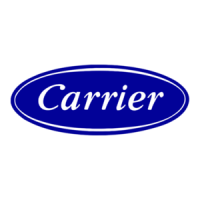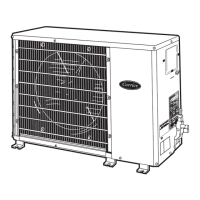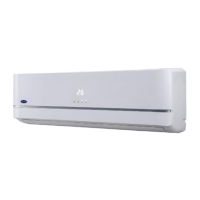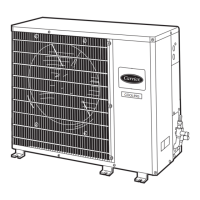16
LONG-LINE GUIDELINE
Table 1 – REQUIRED FIELD INSTALLED
ACCESSORIES FOR AIR CONDITIONERS AND HEAT PUMP
ACCESSORY
REQUIRED FOR
LOW-AMBIENT APPLICATIONS
(BELOW 55°F)
REQUIRED FOR
LONG-LINE
APPLICATIONS*
(OVER 50 FT)
REQUIRED FOR
SEA COAST
APPLICATIONS
(WITHIN 2 MILES)
Crankcase Heater
Yes Yes No
Evaporator Freeze Thermostat
Yes No No
Winter Start Control
Yes† No No
Accumulator
No No No
Compressor Start Assist
Capacitor and Relay
Yes Yes No
Low Ambient Controller,
MotorMaster™ Control,
or
Low-Ambient Pressure Switch
Yes No No
Wind Baffle
See Low-Ambient Instructions No No
Coastal Filter
No No Yes
Support Feet
Recommended No Recommended
Liquid-Line Solenoid Valve
or
Hard-Shutoff TXV
No
See Long-Line
Application
Guideline
No
Ball-Bearing Fan Motor
Yes‡ No No
Isolation Relay
Yes** No No
*For tubing line sets between 50 and 175 ft, refer to Residential Split-System Long-Line Application Guideline.
†Only when low-pressure switch is used.
‡Required for Low-Ambient Controller (full modulation feature) and MotorMaster™ control only.
** Required on Heat Pumps only.
This Long-Line Application Guideline applies
to all Carrier residential air conditioner and
heat pump split systems that have a nominal
capacity of 18,000 to 60,000 Btuh. This
guideline provides required system changes
and accessories necessary for any residential
product having piping requirements greater
than 50 ft or installations where indoor unit is
located above outdoor unit.
This guideline is intended to cover applications
outside the standard Installation Instructions.
This guideline is for standard, single-speed
products. For applications involving 2-speed
products, refer to Step 6 first.
NOTE: The presale literature for outdoor unit
must be referred to in conjunction with this
guideline.
Step 1—Approved Systems
Any residential indoor/outdoor unit
combination listed in the outdoor unit presale
literature is an approved system, EXCEPT the
following:
• Indoor coils with capillary-metering devices
• All equipment less than nominal 18,000 Btuh
• All 1/4-in. and 3/16–in. liquid-line
applications
• Any indoor furnace coil/fan coil not listed in
outdoor unit presale literature
• Any application which has interconnecting
tubing with an equivalent length greater than
175 ft
Step 2—Interconnecting Tubing Sizing
Table 2 lists recommended interconnecting
vapor-line diameters for equivalent total-line
lengths. All residential split systems installed
in long-line applications must use only 3/8-in.
liquid lines. Equivalent line length equals the
linear length (measured) of interconnecting
vapor tubing plus losses due to elbows. (See
Table 3 and Fig. 3.) Liquid lines larger than
3/8-in. OD greatly increase charge quantity of
the system. Excessive charge increases risk of
migration and compressor damage. Table 2
provides the estimated percentage of nominal
cooling-capacity losses based on the standard,
required vapor line size versus what is selected
for the long-line application. Since the vapor
line is the discharge line in heating mode,
losses are minimal.
Calculate the linear length of vapor tube
required, adding any losses for the total
number of elbows for application. (See Table
6.) Using this equivalent length, select desired

